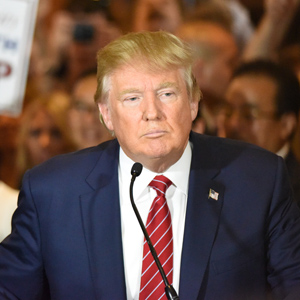Did Justice Ginsburg's comments on Donald Trump violate ethics rules?

Donald Trump. Photo by a katz / Shutterstock.com
Updated: Did Justice Ruth Bader Ginsburg go too far when she criticized Donald Trump?
Ethics and legal experts have varying opinions on whether her comments were better left unsaid. But they do agree she didn’t violate the Code of Conduct for U.S. Judges because it doesn’t bind Supreme Court justices.
The controversy stems from Ginsburg’s recent interview with the New York Times. “I can’t imagine what this place would be—I can’t imagine what the country would be—with Donald Trump as our president,” she said. “For the country, it could be four years. For the court, it could be—I don’t even want to contemplate that.”
Ginsburg didn’t retreat from her comments in an interview with CNN on Monday. “He is a faker,” Ginsburg said of Trump. “He has no consistency about him. He says whatever comes into his head at the moment. He really has an ego. … How has he gotten away with not turning over his tax returns? The press seems to be very gentle with him on that.”
Trump responded to Ginsburg’s comments with a call for her to resign, Politico reports. “Justice Ginsburg of the U.S. Supreme Court has embarrassed all by making very dumb political statements about me. Her mind is shot—resign!” he said in a tweet.
However, on Thursday, Ginsburg released a statement saying she regretted making the remarks about Trump. “My recent remarks in response to press inquiries were ill-advised, and I regret making them,” she said. “Judges should avoid commenting on a candidate for public office. In the future, I will be more circumspect.”
Several law professors and ethics experts asked about Ginsburg’s New York Times interview told the Washington Post that Ginsburg shouldn’t have commented, while the New York Times features experts on both sides of the issue.
The Code of Conduct for U.S. Judges—which applies only to lower federal court judges—says judges should not “make speeches for a political candidate, or publicly endorse or oppose a candidate for public office” or “engage in any other political activity.”
Though the code doesn’t apply to justices, the idea of keeping judges out of politics helps protect the rule of law, according to New York University law professor Stephen Gillers, who wrote a post for the New York Times Room for Debate column.
“Much as I wish it were otherwise,” Gillers writes, “there is no way to read these remarks as nonpolitical. The clear message is that Ginsburg believes that Donald Trump will be bad for the country and the court. I agree, but a Supreme Court justice should not say so.”
“Why do we keep judges out of politics?” Gillers asks. “To protect the rule of law. We want the public to view judicial rulings solely as the product of law and legal reasoning, uninfluenced by political considerations. Acceptance of court rulings is undermined if the public believes that judicial decisions are politically motivated.”
Stetson University law professor Louis Virelli III tells the Washington Post that Ginsburg’s comments could be seen as grounds for her to recuse herself in cases involving Donald Trump and his administration, if he is elected. “I don’t necessarily think she would be required to do that, and I certainly don’t believe that she would in every instance, but it could invite challenges to her impartiality based on her public comments,” Virelli said.
Supporting Ginsburg are University of California at Irvine law dean Erwin Chemerinsky and Georgetown University law professor Paul Butler, who also wrote posts for the Room for Debate column.
“Normally Supreme Court justices should refrain from commenting on partisan politics,” Butler wrote. “But these are not normal times. The question is whether a Supreme Court justice—in this case, the second woman on the court, a civil rights icon and pioneering feminist—has an obligation to remain silent when the country is at risk of being ruled by a man who has repeatedly demonstrated that he is a sexist and racist demagogue. The answer must be no.”
Like Gillers, University of California at Irvine law dean Erwin Chemerinsky notes that Code of Conduct did not apply to the justices. In any event, he doesn’t think its restrictions on political speech “are constitutional or desirable.”
“The First Amendment is based on the strong presumption that more speech is beneficial because it means we are all better informed,” he writes. “I think it is valuable for people to hear what the justices have to say on important issues. As a lawyer and as a citizen, I’d always rather know what justices and judges think rather than have enforced silence and pretend they have no views. We are in a relatively new era of public statements by justices, and I applaud it.”
Updated on July 12 to include Ginsburg’s comments to CNN. Updated on July 13 to include Trump’s response. Updated on July 14 to note Ginsburg’s statement.



